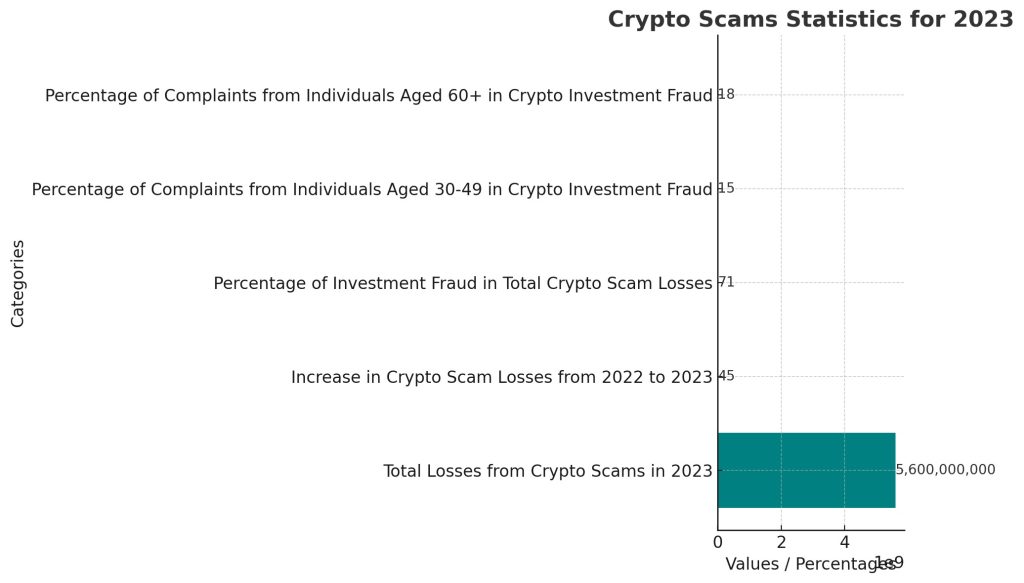The Rise of Crypto Job Fraud
The rising interest in cryptocurrencies and blockchain technology has attracted scammers who exploit job seekers’ enthusiasm through deceptive schemes. The strong market need for blockchain and Web3 professionals has motivated scammers to develop sophisticated cryptocurrency-based deception schemes.
How Crypto Job Scams Work?
Scammers use fake job postings for cryptocurrency to carry out their scams. Scammers impersonate genuine recruiters and companies to deceive job applicants into revealing personal details or spending money on non-existent positions.
The spread of these scams has increased because digital communication provides scammers with minimal opportunities for detection. The knowledge of crypto job scams’ operation methods becomes crucial because it enables job seekers to defend themselves against exploitation in this dangerous field.
The knowledge of these details becomes essential for protecting oneself in an environment where job safety continues to deteriorate.
 The 2023 data about cryptocurrency scams appears in this statistical illustration. The total amount of money lost to cryptocurrency scams reached more than $5.6 billion during 2023 while showing a 45% growth compared to 2022. The majority of investment scams accounted for 71% of total reported cases. The 30-49 age group made up 15% of all complaints but the 60 and older age group reported 18% of complaints.
The 2023 data about cryptocurrency scams appears in this statistical illustration. The total amount of money lost to cryptocurrency scams reached more than $5.6 billion during 2023 while showing a 45% growth compared to 2022. The majority of investment scams accounted for 71% of total reported cases. The 30-49 age group made up 15% of all complaints but the 60 and older age group reported 18% of complaints.
What Are Crypto Job Scams in 2026?
The number of people falling victim to job scams in 2026 has become concerning because technology advances through blockchain and cryptocurrencies were meant to create progress.
The scams present themselves as unrealistic job opportunities which target people who want to earn money and establish their professional careers. The scammers pretend to represent actual companies while demanding access to your personal information and bank details or cryptocurrency deposits to secure the job position.
Remote work scams occur when scammers pretend to be hiring managers who search for part-time remote workers according to research findings. The scammers exploit remote work opportunities to deceive job applicants.
The combination of authentic job opportunities with significant dangers in the modern online job market becomes evident when viewing Bitcoin images displayed with ‘FRAUD ALERT’ warnings. The knowledge of these scams enables job seekers to defend themselves from financial loss when pursuing cryptocurrency careers.
| Year | Reported Losses (USD) | Number of Reports |
| 2021 | Over $1 billion | 46,000+ |
| 2023 | Over $5.6 billion | 45% |
| 2024 | At least $9.9 billion | $12.4 billion (24%) |
| 2024 | 71% | |
| 2024 | 10% | |
| 2024 | 33.2% | 40% |
| 2024 | 50.2% | |
| 2024 | 53% | |
| 2024 | 35% | |
| 2024 | 9% | |
| 2024 | 7% | |
| 2024 | 120% increase from previous year |
Crypto Job Scams Statistics
How Crypto Job Scams Work?
Fake Crypto Jobs
The crypto industry faces sophisticated job scams which target unsuspecting job applicants. The deception targets job applicants who demonstrate understandable enthusiasm for employment opportunities. The scam starts when scammers send phishing emails which present fake crypto job opportunities that seem too good to be true and offer both high compensation and remote work flexibility.
Fake Crypto Job Offer Email
The emails direct users to deceptive websites which present themselves as authentic crypto exchanges and new businesses. The websites present a legitimate appearance through their design which makes everything seem authentic.
The interview process takes place through Telegram and WhatsApp applications. The platforms serve as preferred choices for scammers because they provide better anonymity. The initial tasks seem regular but they actually require users to download malicious software or reveal their personal information by mistake.
Fake Crypto Recruiter Scams
Fake recruiter scams occur frequently because scammers impersonate actual recruiters which makes it challenging to identify authentic job opportunities.
The entire process starting with job seekers who interact with fake recruiters who execute scams is illustrated in the flowchart “Job seeker → Fake recruiter → Interview/email → Scam execution”. The flowchart demonstrates why job seekers need to exercise caution when using the dangerous online job market.
Crypto Job Scam with Fake Check
Fake check scams operate as part of crypto job scams which involve criminals impersonating employers to trick people into sending money or revealing personal information.
The scammers use fake job postings to trick people into sending money or personal information through their cryptocurrency job scams.
The scammers specifically target people who want to work remotely or as freelancers in Web3 and crypto fields. The scammers use fake checks as part of their scheme to deceive victims.
The process of fake check scams functions as follows:
- The scammers present fake job opportunities with flexible work arrangements and conduct brief interviews to create an impression of authenticity.
- The scammer sends a check to the victim which they must deposit according to their instructions.
- The scammer demands the victim to send part of the received funds back to them through wire transfer because they claim it is needed for training materials or software access or work activation.
- The victim faces complete financial loss because the check fails to clear after they withdraw funds which they then send to the scammer. The victim loses their sent money, and the job opportunity vanishes.
The following warning signs will help you detect crypto job scams:
- Job seekers should be wary of unsolicited job offers because they often come without prior application for the position.
- Any request for payment from a potential employer before starting work should be treated as a warning sign because legitimate employers never ask for such funds.
- Scammers utilise unendorsed or unofficial chat apps such as WhatsApp or Telegram instead of company email addresses for their communication with victims.
- Job offers that are known to make unrealistic or impractical remuneration promises or guarantee easy money with very little or barely any work should be pickled with disbelief.
- Scammers are notorious for making time-sensitive offers and restricted positions to force victims into hurried decisions without conducting proper verification checks.
- You should never give out your cryptocurrency wallet access or secret keys or private keys or bank account information or download unverified crypto applications.
Research the company and recruiter through multiple channels to verify their existence by checking for official websites and active employee profiles.
- Check the check’s authenticity before making any deposit transactions.
- Contact your bank through their official contact channels to determine if the check has any value.
- You should never send money or goods before the check has on LinkedIn and a professional online presence.
What actions should you take when you receive a suspicious check completed its clearing process because the funds might appear available, but the check could still bounce later.
What actions should be taken after falling victim to a scam?
- You should take immediate action when you suspect you have become a victim of a crypto job scam. Stop all contact with the scammer and collect all available evidence including messages emails and transaction records. File a report about the scam with your local authorities through the FBI Internet Crime Complaint Center (IC3) in the US or the National Cyber Crime Reporting Portal in India.
- Also, informing your bank about any financial information you shared or payment transactions you made becomes as much important.
- Also, protecting you your online security by changing your passwords and enabling two-factor authentication for all your accounts is imperative.
Conclusion
The modern job market requires job applicants to exercise extreme caution because crypto job scams occur frequently. People need to remain vigilant because scammers have become more cunning in their tactics.
The identification of suspicious job offers including excessive payment promises and initial financial requests will assist you in navigating the challenging job search process. The analysis of these scams demonstrates that job seekers must conduct thorough research to verify recruiter authenticity and job legitimacy.
Crypto Job Interview on Telegram
Using established communication methods instead of Telegram and other random apps helps people avoid falling victim to crypto job scams.
The image which displays Bitcoin copies alongside a FRAUD ALERT warning effectively demonstrates the risks of crypto job scams while emphasizing the need for digital world scepticism through thorough research.

Bitcoin and Fraud Alert: Examining Risks in Cryptocurrency
References:
- • JADE BOGNA. ‘CRYPTO TRAP: MY JOURNEY THROUGH THE WEB OF ONLINE SCAMS.’ Jade Bogna, 12/19/2024
- Jason Scharfman. ‘The Cryptocurrency and Digital Asset Fraud Casebook, Volume II.’ DeFi, NFTs, DAOs, Meme Coins, and Other Digital Asset Hacks, Springer Nature, 6/7/2024
- Link
Image References:
- Image: Bitcoin and Fraud Alert: Examining Risks in Cryptocurrency, Accessed: 2025. https://www.jefferson-bank.com/globalassets/images/articles/bitcoin-scam.png?v=1D88261A4750280
You need to login in order to Like





















Leave a comment